
The real estate industry in Portugal has shown remarkable resilience compared to other commerce sectors. Despite worldwide economic challenges in recent years, including the pandemic, the Portuguese real estate market has continued to experience steady growth. Sales have exceeded previous years, and housing prices have been on the rise since 2015, according to Statistics Portugal (INE).
As of mid-2024, the median value per square metre has reached new heights, with the average property price rising from the country's average of €763 per square metre (€70.89 per square foot) in July 2014 to €1,736/m² (€161.28/ft²) according to data released on 22nd October 2024. However, concerns about the sustainability of this growth persist, prompting questions regarding the foundation of these numbers. In this article, we will discuss the ongoing housing crisis in Portugal and why, despite this, the country remains a prominent market for profitable foreign investment opportunities.
The Housing Crisis in Portugal - Current Market Situation
Over the past decade, Portugal has become an attractive financial destination, boasting a thriving real estate market with a wealth of opportunities for investors. The surging demand for short and long-term rentals—fuelled by a booming tourism industry and the growth of the foreign resident population, which now represents 10% of the country's inhabitants—has created a favourable environment for property owners.
Eurostat, for instance, has reported that housing prices in Portugal have surged by over 106% in the period between 2010 and the second quarter of 2024, surpassing the European Union's average. This information demonstrates that Portugal not only has high demand in its real estate sector but also a low supply of properties, inflating the prices of those available.
The housing price statistics produced by Eurostat go further, highlighting the countries with the highest price increases in the past 14 years: “When comparing the second quarter of 2024 with 2010, among the EU countries for which data are available, house prices increased more than rents in 20 countries. House prices more than tripled in Estonia (+232%) and Hungary (+218%), and more than doubled in Lithuania (+178%), Latvia (+146%), Czechia (+131%), Austria (+111%), Portugal (+106%), Luxembourg (+103%) and Bulgaria (+102%).”
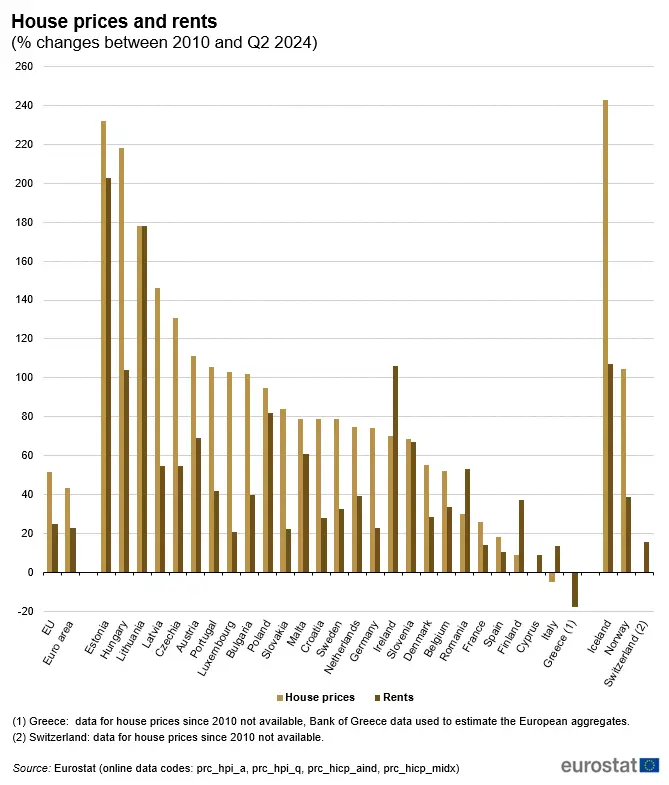
The escalation is more severe in major regions like Porto and Lisbon, where both property purchase and rental values have increased significantly. Industry experts attribute this situation to the fact that only one house has been constructed for every ten sold since 2018, an alarmingly low number.
The result of is reflected in the statistics released by INE, demonstrating galloping inflation in every report. According to the most recent official data from INE (Statistics Portugal) released on 22nd October 2024, the median house price in Portugal marked an increase of 6.6% compared to the same period in 2023, up from a 5.0% increase in the previous quarter. Year-on-year, the median house price rose in 21 out of the 26 Portuguese sub-regions, with the Viseu Dão Lafões sub-region—located in the northern part of the Central Region—exhibiting the highest growth at 17.2%.
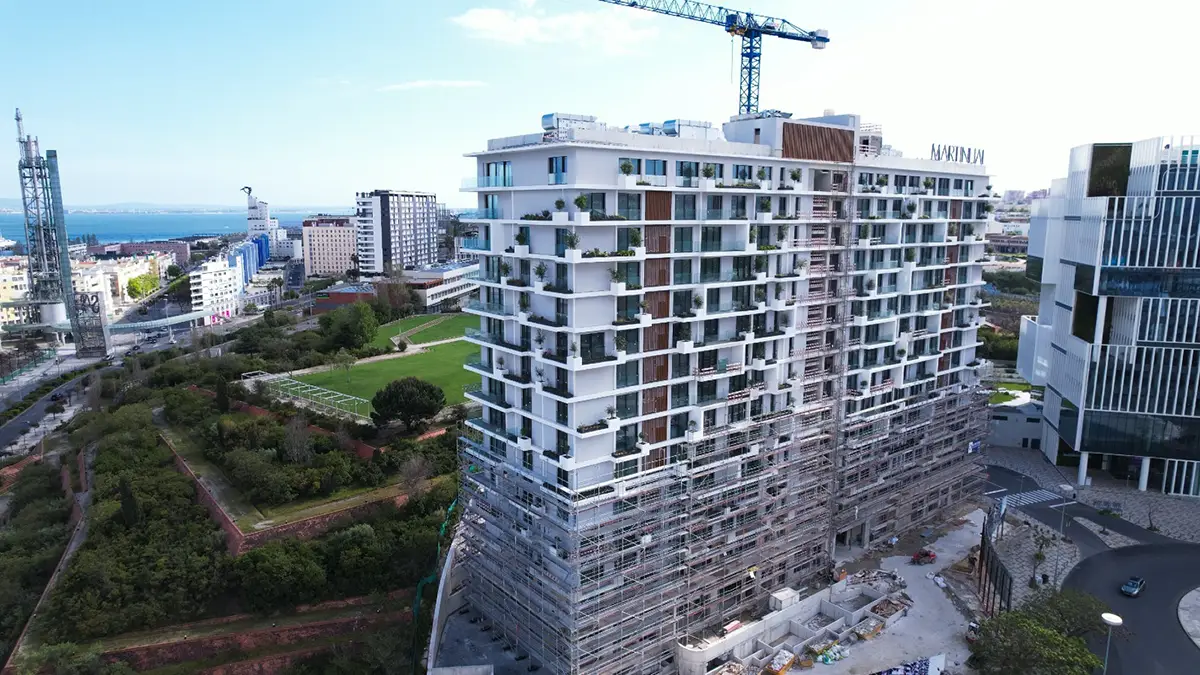
One Year Later, the "Mais Habitação" Bill Proved to Be Merely a Political Propaganda Initiative
On 16th February 2023, the former Portuguese government unveiled the "Mais Habitação" (Housing Bill), aiming to combat real estate speculation and the sharp rise in rents. The proposal sought to address the housing crisis by boosting supply, regulating the market, and ending the real estate option in the Golden Visa Programme. However, more than a year later, the effectiveness of this Housing Bill remains questionable.
Back in 2023, when former Prime Minister António Costa introduced the plan, several Portuguese political figures opposed it. Lisbon's mayor, Carlos Moedas, criticised the former government's approach, stating it was "very serious" that local authorities were not consulted. Similarly, Miguel Albuquerque, President of the Madeira Regional Government, took issue with parts of the new programme, advocating for a focus on areas needing investment, growth, and development rather than implementing blanket policies that might hinder economic progress.
Although the 2023 Portuguese real estate results fell short of expectations, demonstrating the flaws in the Housing Bill, the market responded quickly.
Fast forward to February 2024, following new legislative elections, Portugal got a new government with a completely different approach to the housing crisis. With a liberal perspective, the government led by Luís Montenegro announced in April a 4-Year Executive Plan addressing the housing crisis.
Among other suggestions, the plan aims to "enhance and create real estate funds in collaboration with banks and property owners." The goal of this strategy is to enable businesses to finance their operations through the leaseback of their properties, with an option to repurchase within a specified timeframe. Other initiatives include relaxation of land occupancy restrictions, urban density limits (including high-rise construction), and construction requirements, along with the potential expansion of urban boundaries and new IMT and IS exemptions for real estate purchases by people under 35 years of age.
Admitting that the Housing Bill was not the best approach, the Portuguese government expressed in 2024 its commitment to repealing harsh regulations such as forced leasing, rent freezes (while providing subsidies to vulnerable tenants), and punitive measures against local accommodations, as originally stated in the Mais Habitação bill. In summary, while the Housing Bill aimed to tackle the housing crisis, it did not have the desired effect on the market.
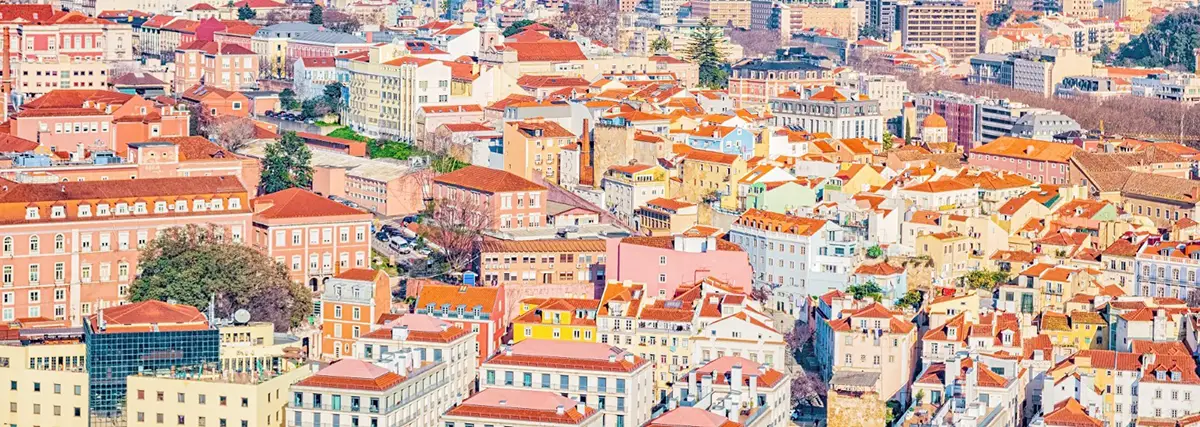
Portugal Golden Visa - Is It Rightfully Blamed for the Housing Crisis?
Back in October 2023, when the Housing Bill was enacted, the real estate option under the Golden Visa Programme was discontinued. Although the former Socialist government saw this move as a positive step towards addressing the housing crisis and curbing speculation in the country, numerous specialists had predicted the Golden Visa Programme was not the root of the problem. In fact, it had been a beneficial economic tool, attracting over €7 billion to Portugal's economy.
After a year since the end of the Golden Visa real estate option, it is clear that the housing crisis in Portugal is a deeper and more complex issue. High demand for housing—spurred by a significant surge in tourism, foreign population growth, and a shortage of residential properties—has driven prices up considerably. While the real estate industry has shown remarkable strength and stability despite the inflation, blaming the Golden Visa overlooks other critical factors at play.
Thanks to sensationalist headlines in the local press, the Golden Visa Programme became an easy scapegoat for the soaring property prices and the housing crisis. However, the data paint a different picture: the surge in property prices in Lisbon is actually directly linked to the booming tourism industry. The massive increase in visitors to Portugal over the past decades—from 13.1 million arrivals in tourist accommodations in 2006 to over 55 million in 2024—highlights this impact.
Preliminary data released on 14th October 2024 by INE showed that tourist accommodation establishments registered nearly 55.1 million overnight stays from January to August 2024, an incredible number, considering that the country's infrastructure and housing accommodation did not keep pace with this growth.

Project Development and Off-Plan Construction: A Viable Solution
Portugal's housing shortage is a complex issue that requires long-term solutions. It is crucial for the country to invest in new residential infrastructure to tackle this problem head-on. Portugal has always been a prominent real estate market for foreign investment, and sticking to this path is essential if the country wants to renew the infrastructure and sort out the housing shortfall.
Understanding this, development projects are essential to bring modernity to facilities in Lisbon, Porto, and the Algarve, building a better Portugal for everyone—citizens, expats, and residents alike.
In Lisbon, off-plan construction is the way forward. Modernising the city's buildings is not just necessary; it has been pivotal for Portugal over the past ten years, especially for safety reasons. For example, on 26th August 2024, at precisely 5:12 AM, residents of Lisbon were startled awake as their beds shook when, for 12 seconds, they experienced the unsettling effects of an earthquake with an intensity not seen since 1969. Although frightening, the phenomenon did not affect any constructions and caused no damage in the city.
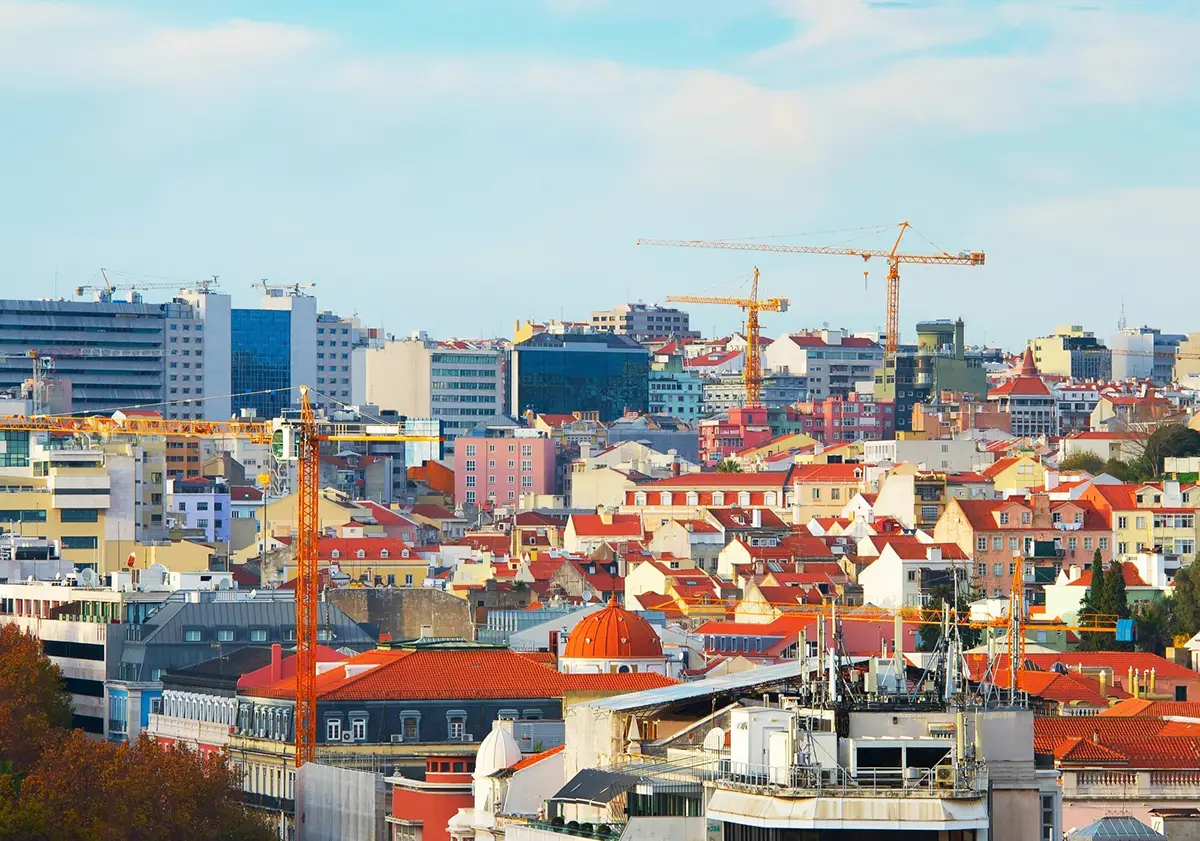
The wake-up call of a natural phenomenon brought up an important matter in Lisbon: the old buildings and ruins. As of 2024, the city—and a major part of the country—still has a large number of vacant buildings, just waiting to be repurposed. Thanks in large part to the Golden Visa programme, which prominently featured real estate renovation options, we have seen a significant transformation in urban development, especially in Lisbon and Porto.
By investing in off-plan projects, not only is the investor updating the city's landscape but also addressing the housing demand directly. These developments offer modern amenities and sustainable designs, meeting the needs of today's homeowners and investors. Off-plan investments allow buyers to secure properties at competitive prices while contributing to the revitalisation of Lisbon's architectural heritage. It is a win-win situation that boosts the economy, preserves cultural landmarks, and provides much-needed housing solutions.
Exclusive Real Estate Investment Opportunities in Portugal
Recognising the abundant investment potential in the country, developers in Portugal have been creating projects tailored for investors interested in purchasing and renovating properties for investment purposes. By offering comprehensive services, these initiatives ensure that clients experience both security and profitability throughout the rehabilitation process. From navigating initial regulations to the completion of renovations, investors are provided with a seamless experience. Over the past five years, numerous projects have been completed, encompassing residential, commercial, and hospitality properties such as hotels and resorts across Portugal.
For instance, in 2022-2023, significant accomplishments of Portugal Homes included the rehabilitation and construction of the Portimão Hotel, a seven-floor building spanning 2,956 sqm, fully licenced under the new 2022 regulations for the Algarve. Previously an abandoned building, rotting and marring the landscape of Portimão, it has now, due to the Golden Visa programme, become a new hotel option for the city. This kind of investment not only boosts the economy but also enhances the hospitality industry in the country.
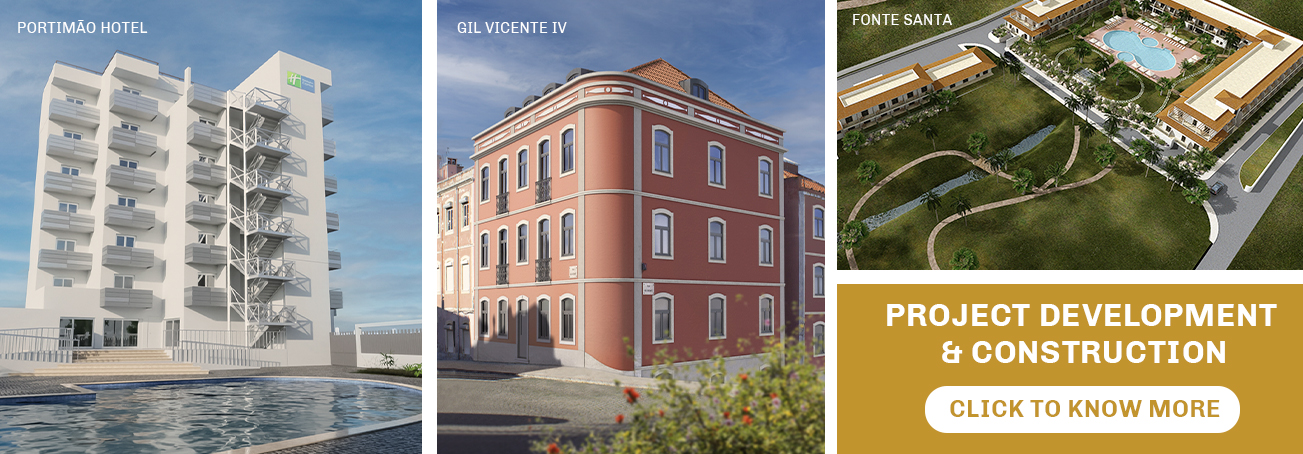
Another exclusive development from Portugal Homes, also an off-plan project, is the Fonte Santa four-star resort in the Algarve's Golden Triangle, a renowned area celebrated for its excellent golf courses, luxurious holiday spas, and Michelin-starred restaurants. Fonte Santa Resort is a state-of-the-art project. What was once a ruin is now undergoing construction as a resort, comprising 122 units, swimming pools, a pool bar, gardens, tennis and paddle courts, extensive amenities, and is set to be fully completed by the beginning of 2025.
In February 2023, a new development from Portugal Homes was also launched in Lisbon’s city centre: the Mátria co-working space. This exceptional opportunity in the heart of the Portuguese capital features a commercial space of seven floors equipped with amenities such as a coffee shop, a gym, private meeting rooms, and locker storage areas. It serves as an ideal workplace and meeting point for digital nomads and startup entrepreneurs.
While exclusive real estate investment opportunities and off-plan projects present valuable solutions for investors and contribute positively to the market, they alone cannot resolve Portugal's housing crisis. The fundamental issue is the significant imbalance between the soaring demand for housing and the insufficient supply available. To effectively address this challenge, it is crucial to increase the overall housing stock through the creation of new constructions. This involves not only building more residential units but also implementing policies and initiatives that promote sustainable development and affordability. By expanding the supply to meet the growing demand, Portugal can work towards stabilising the housing market and providing accessible housing options for all.
Read more:
Buying Property in Portugal as a Foreigner in 2025: The Ultimate Guide






